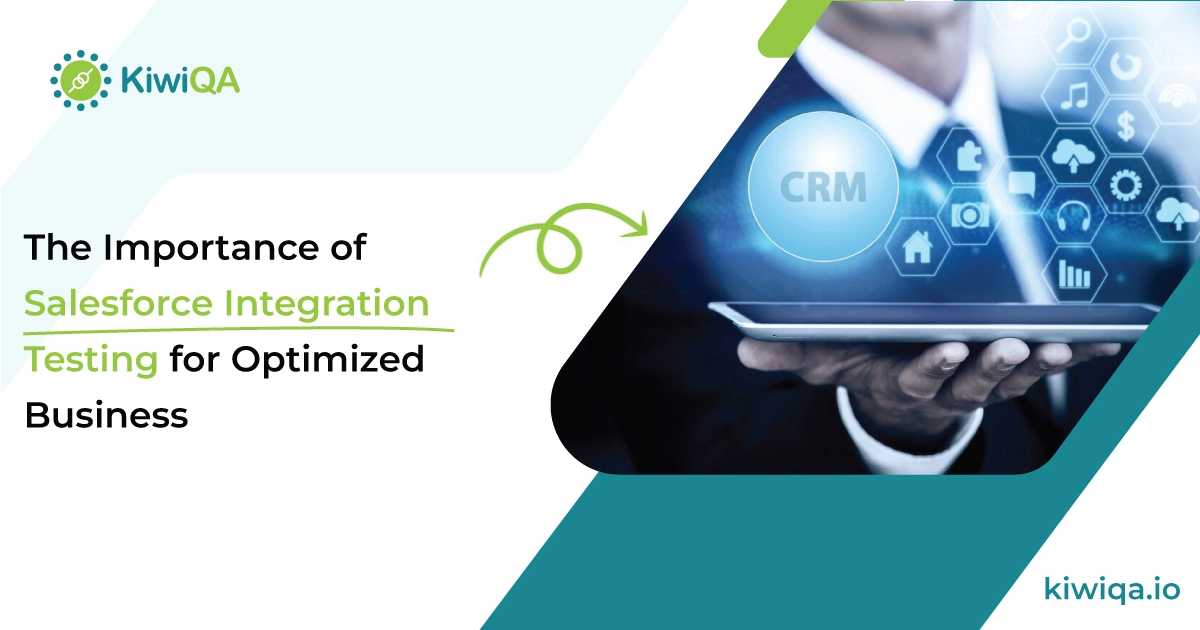The Importance of Salesforce Integration Testing for Optimized Business Operations

 KiwiQA
KiwiQATable of Contents
In today’s fast-paced software development environment, companies are adopting increasingly sophisticated techniques to meet aggressive release timelines. As development tools and methodologies evolve, so does the complexity of testing requirements. Specialized tests, tailored for specific platforms and use cases, have become an essential part of modern QA practices.
Among these, Salesforce testing services have emerged as a critical component. Salesforce, a highly customizable and widely adopted CRM platform, supports a multi-layered network of business operations across marketing, sales, and customer service. However, with frequent cloud updates, numerous third-party integrations, and ongoing customizations, Salesforce environments are dynamic and prone to disruptions if not properly tested.
More than 150,000 businesses worldwide rely on Salesforce for mission-critical operations. Without a solid QA strategy, organizations risk facing data corruption, workflow disruptions, security vulnerabilities, and performance issues.
This blog explores why Salesforce integration testing is essential and outlines best practices to develop a robust testing approach.
Salesforce Integration Testing evaluates how different internal and external components interact within and beyond the Salesforce ecosystem. These components can include third-party systems, APIs, or additional Salesforce instances. The goal is to identify issues that arise during these integrations and ensure smooth, reliable system interactions.
Through integration testing, businesses can validate data flows, performance, and overall functionality, ensuring that customizations and connected systems operate seamlessly. Given Salesforce’s inherent complexity — combining CRM, marketing, e-commerce, and operations technologies — integration testing is vital for maintaining functional consistency and business continuity.
◈ Verifying that interconnected systems function correctly and align with business goals.
◈ Ensuring the optimal performance, availability, and security of critical components.
◈ Increasing test coverage to validate all integrated parts before full system testing.
◈ Confirming that Salesforce solutions continue to meet evolving customer and business needs.
Integrating Salesforce with ERP systems connects CRM data with finance, operations, and logistics processes. This unification enables real-time decision-making, enhanced customer service, and seamless data flow across departments.
Salesforce Marketing Cloud can be integrated with marketing automation platforms such as ActiveCampaign, Keap, and HubSpot. These integrations streamline lead nurturing, campaign management, and marketing operations, creating a cohesive customer journey.
Salesforce’s integration with e-commerce solutions like Shopify, BigCommerce, and WooCommerce enhances customer experiences, synchronizes sales data, and optimizes inventory and order management.
Custom APIs and middleware solutions simplify complex integrations, enabling direct communication between Salesforce and other systems. Middleware platforms act as a bridge, easing data exchange and managing workflows between disconnected systems.
Also Read : How To Test Salesforce Lightning Components
Integration testing validates the accuracy and consistency of data across all connected systems, reducing risks associated with data corruption and ensuring reliable business intelligence.
By identifying integration issues early, businesses can optimize workflows, reduce errors, and enhance operational efficiency.
Smoothly functioning integrations lead to consistent, high-quality customer interactions, ultimately improving satisfaction and loyalty.
Effective integration testing minimizes system downtime, ensures performance under load, and identifies potential risks before they impact users, supporting seamless and uninterrupted business operations.
Begin by understanding business workflows, Salesforce configurations, and integration points. Define the testing scope, tools, environments (sandbox or staging), and resources needed.
Outline clear test scenarios, including inputs, actions, and expected outcomes. Prepare isolated test data to prevent interference with live business records.
Validate that data flows correctly between Salesforce and integrated systems, ensuring integrity, accuracy, and consistency across platforms.
Track issues using a bug management system, prioritize defect resolution, and document all findings for future reference and platform stability.
Assess how Salesforce applications handle real-world loads, identifying bottlenecks and ensuring scalability and resilience under varying user demands.
Integrate QA engineers, developers, and business analysts from the beginning to ensure a holistic view of integration points and better alignment with business objectives.
Utilize sandbox environments for initial testing and staging environments for final pre-deployment validations to detect and resolve issues early.
Automate repetitive integration tests to ensure consistency and efficiency, but complement them with manual testing for critical user flows and UX validation.
Develop standardized documentation with clear scopes, objectives, results, and revision histories. Regular updates ensure that documentation reflects evolving systems.
Embed integration testing into CI/CD pipelines to detect issues early, speed up feedback loops, and maintain high-quality deployments.
Also Read : End-to-End Salesforce Automation Testing for Marketing and Service Cloud Success
A well-structured Salesforce integration testing strategy ensures that your CRM ecosystem remains resilient, secure, and capable of adapting to business changes. Implementing AI-powered codeless test automation tools can further enhance testing speed, accuracy, and coverage.
Partnering with a specialized Salesforce testing company provides access to expertise, best practices, and proven methodologies. Their experience in navigating Salesforce’s complexity can help your organization avoid costly errors, ensure platform reliability, and unlock maximum value from your Salesforce investments.
Effective Salesforce integration testing transforms potential risks into competitive advantages — ensuring business continuity, delighted customers, and sustainable growth.
Salesforce’s flexible yet complex environment demands meticulous testing to sustain high-quality business operations. By embracing a strategic approach to integration testing — involving early planning, automation, cross-team collaboration, and expert partnerships — organizations can ensure that their Salesforce solutions drive long-term success.
For more guidance or tailored support, connect with a Salesforce testing services expert to optimize your testing strategy and strengthen your digital ecosystem.
Join the like-minded community & get the latest updates and insights on software testing technological transformation around the globe. Don't miss out.
